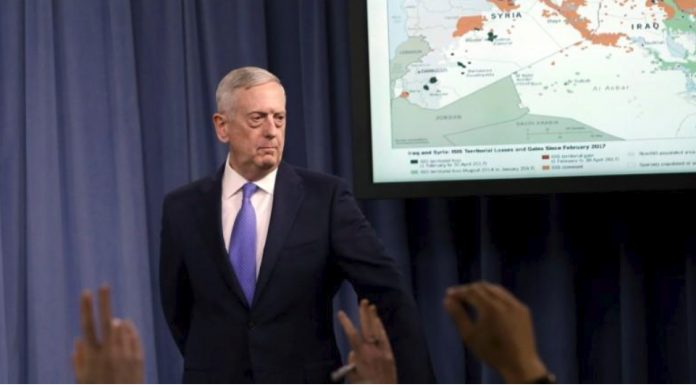By Phil Stewart
WASHINGTON, March 15 – U.S. Defense Secretary Jim Mattis accused Iran on Thursday of “mucking around” in Iraq’s May parliamentary election, in which Prime Minister Haider al-Abadi is seeking another term after a successful, U.S.-backed war against Islamic State militants.
The ballot will decide Iraq’s leader for the next four years, when Baghdad will be faced with rebuilding cities and towns seized from Islamic State, preventing the militants’ return and addressing the sectarian and economic divisions that fueled the conflict.
Among Abadi’s challengers are former Prime Minister Nuri al-Maliki and Hadi al-Amiri, a former transportation minister – both of whom are among Iran’s closest allies in neighboring Iraq. Mattis stopped short of detailing whom Iran sought to influence but said it was doing so by channeling cash into Iraqi politics. “We have worrisome evidence that Iran is trying to influence – using money – the Iraqi elections. That money is being used to sway candidates, to sway votes,” Mattis told reporters as he flew back to Washington after a trip to the Middle East and Afghanistan. “It’s not an insignificant amount of money, we believe. And we think it’s highly unhelpful.”

There was no immediate comment from Iran, which has in the past denied interfering in Iraq. Mattis compared Iran’s actions to those of Russia, which the U.S. intelligence community has concluded attempted to influence the 2016 U.S. presidential election in favor of Donald Trump. Russia denies this. “Iran is following Russia’s example of mucking around in Iraq’s elections,” Mattis said. He declined to say whether he thought the Iranian effort had been successful or say whether Iran sought to undermine Abadi.
Mattis said his trip to Afghanistan and the Middle East reinforced his concerns about Iran’s activities in the region, from stoking violence in Syria to aiding insurgents in western Afghanistan.
The United States also accuses Iran of escalating the civil war in Yemen and threatening to turn it into a broader regional conflict by supplying advanced weaponry, including missiles, to Houthi rebels who have fired at targets in Saudi Arabia. Mattis said Iran was using Yemen as a testing ground for its weapons. “It’s where you find their radars, their ballistic missiles, their anti-ship cruise missiles. We found their mines, their explosive boats all being tested,” he said. Still, the U.S. Navy told reporters traveling with Mattis that provocations by Iran had decreased in the Gulf.
Iran’s naval vessels halted their fairly routine, aggressive maneuvers near U.S. ships last August. U.S. officials including Mattis said they were unsure why. But Mattis said that the drop-off in naval maneuvers was an outlier in an otherwise clear pattern of aggressive behavior. “It was just brought home to me again that they are not changing their behavior, they are continuing to be a destabilizing influence,” Mattis said.
(Reporting by Phil Stewart; Editing by Cynthia Osterman)


